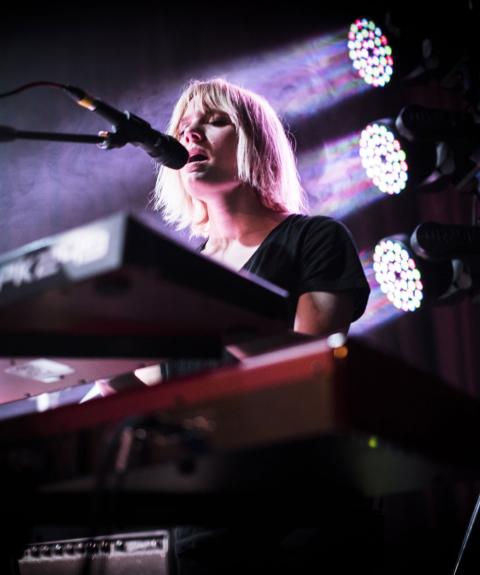West Coast News

Neara Russell ’10
Growing up in rural Wisconsin, Neara Russell ’10 played piano, wrote classical music and pop songs and dreamed of being Sheryl Crow. And now? It’s not all that far off, though she’s not center stage. She now lives in Los Angeles and spent the summer backing Hayley Kiyoko, a breakout pop star fans call “Lesbian Jesus.” Along with playing keyboards, singing and looking cool at sold-out arenas—a tough enough job to get—she’s leading the band, armed with three laptops and iron concentration.
By the time Russell arrived at Berklee on a full-ride Presidential Scholarship, she’d already appeared on the NPR music show From the Top and taken a master class with classical composer John Corigliano. At Berklee, she studied composition techniques, songwriting, keyboard, voice, and digital production.
Russell credits Berklee with the chops and the connections that gave her a crucial solid base. “I always felt so supported,” she says. “My skills have gotten me where I am.”
She was less ready for Los Angeles’s intense focus on image though. Booked for her first big pop music job, “I was just so nervous about providing my worth as a musician, and [then] I spent the entire day sitting in a chair getting a haircut,” she says. “They cut 10 inches of my hair and dyed it blonde.” The lowest point was a gig playing “Pour Some Sugar on Me” on a grand piano at a corporate awards ceremony while wearing a spangled bikini. “That was just a value system I hadn’t prepared for,” she says.
Fortunately, she’s playing a better gigs now. As befits a nature lover, she’s climbed. In addition to being Kiyoko’s bandleader, Russell serves as the music director for both Skylar Grey and Bonnie McKee.
In the pop music world, the music director (MD) has the role of translating the artist’s vision into notes and bytes. It’s a fluid role, according to Russell, but typically the MD hires and negotiates salaries with the band, creates arrangements, rehearses the band, and when needed, hires an on-tour bandleader. The MD also programs the all-important playback sessions. Those are the computer tracks that not only augment the live band (sorry, kids), but also cue lights, keyboard patch changes, and run the click track to the players’ earphones. “It’s all set to keep the band together and keep the show moving and consistent,” Russell says. “The whole show is hinging on that session.” Which is why she has a second laptop on stage loaded with the exact same tracks, just in case.
Few music directors or audio engineers are women. “It’s been an uphill battle,” Russell says. “I’ve had a few advocates who have really given me a leg up,” particularly former classmate Drew Taubenfeld ’06. “Sometimes it’s hard to be taken seriously.”
The role can be bittersweet—like when she stood at midnight in Times Square with Hayley Kiyoko and watched the Spotify billboard change to Kiyoko’s face. “I share these incredibly unique experiences, but I’m on the right side of the stage or the left side of the stage. I’m not in the center,” Russell says.
But generally, Russell’s happy with the balance she’s struck. She enjoys working with other people’s music—the technicality “really appeals to my classical background,” she says. She gets some respite from stage fright. And being so close to stardom, she sees its downsides. “The percentage of their day that actually goes into creating or being a musician is so slight,” she says. “In some ways it’s a disadvantage to have the fame.”
At home in Los Angeles, Russell writes and produces with indie artists such as songstress Monogem (a.k.a. Jen Hirsh ’08). She’s germinating ideas for her next solo album. “I don’t feel fulfilled as a musician if I’m not creating at least part of the time,” she says.
These days, a lot of that writing is collaborative, versus her earlier do-it-all-yourself practice. She feels that people connect more easily to music created by more than one person. And it’s no longer so much about her. When Russell writes songs these days, she thinks about the listeners: What do they need? How can she best serve them? “I no longer have to be the one to say everything,” she says.




